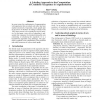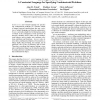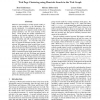IJCAI
2007
14 years 1 months ago
2007
In this paper, a Multi-agent System (MAS) is presented for providing clinical decision support to healthcare practitioners in rural or remote areas of India for young infants or c...
IJCAI
2007
14 years 1 months ago
2007
In recent years, the combinatorics of argumentation with arguments that can attack each other has been studied extensively. Especially, attack graphs (put in the focus of attentio...
IJCAI
2007
14 years 1 months ago
2007
Eliminating previously recommended products in critiquing limits the choices available to users when they attempt to navigate back to products they critiqued earlier in the dialog...
IJCAI
2007
14 years 1 months ago
2007
ESSENCE is a new formal language for specifying combinatorial problems in a manner similar to natural rigorous specifications that use a mixture of natural language and discrete ...
IJCAI
2007
14 years 1 months ago
2007
We investigate the problem of mining closed sets in multi-relational databases. Previous work introduced different semantics and associated algorithms for mining closed sets in mu...
IJCAI
2007
14 years 1 months ago
2007
To test large scale socially embedded systems, this paper proposes a multiagent-based participatory design that consists of two steps; 1) participatory simulation, where scenario-...
IJCAI
2007
14 years 1 months ago
2007
In this paper, we propose a new progression mechanism for a restricted form of incomplete knowledge formulated as a basic action theory in the situation calculus. Specifically, w...
IJCAI
2007
14 years 1 months ago
2007
Effective representation of Web search results remains an open problem in the Information Retrieval community. For ambiguous queries, a traditional approach is to organize search ...
IJCAI
2007
14 years 1 months ago
2007
There is currently much interest in using external memory, such as disk storage, to scale up graph-search algorithms. Recent work shows that the local structure of a graph can be ...
IJCAI
2007
14 years 1 months ago
2007
Programming a humanoid robot to walk is a challenging problem in robotics. Traditional approaches rely heavily on prior knowledge of the robot's physical parameters to devise...



